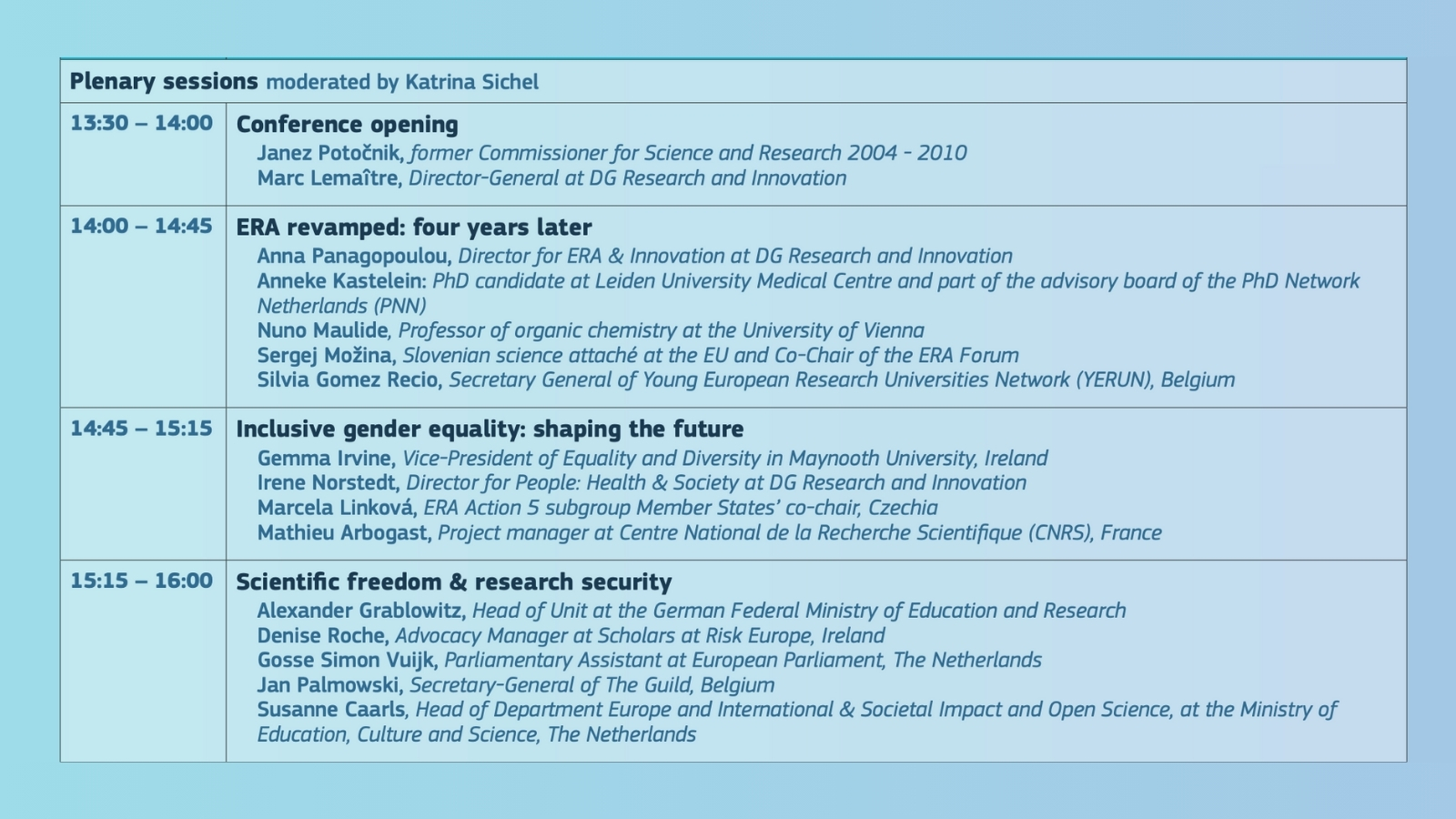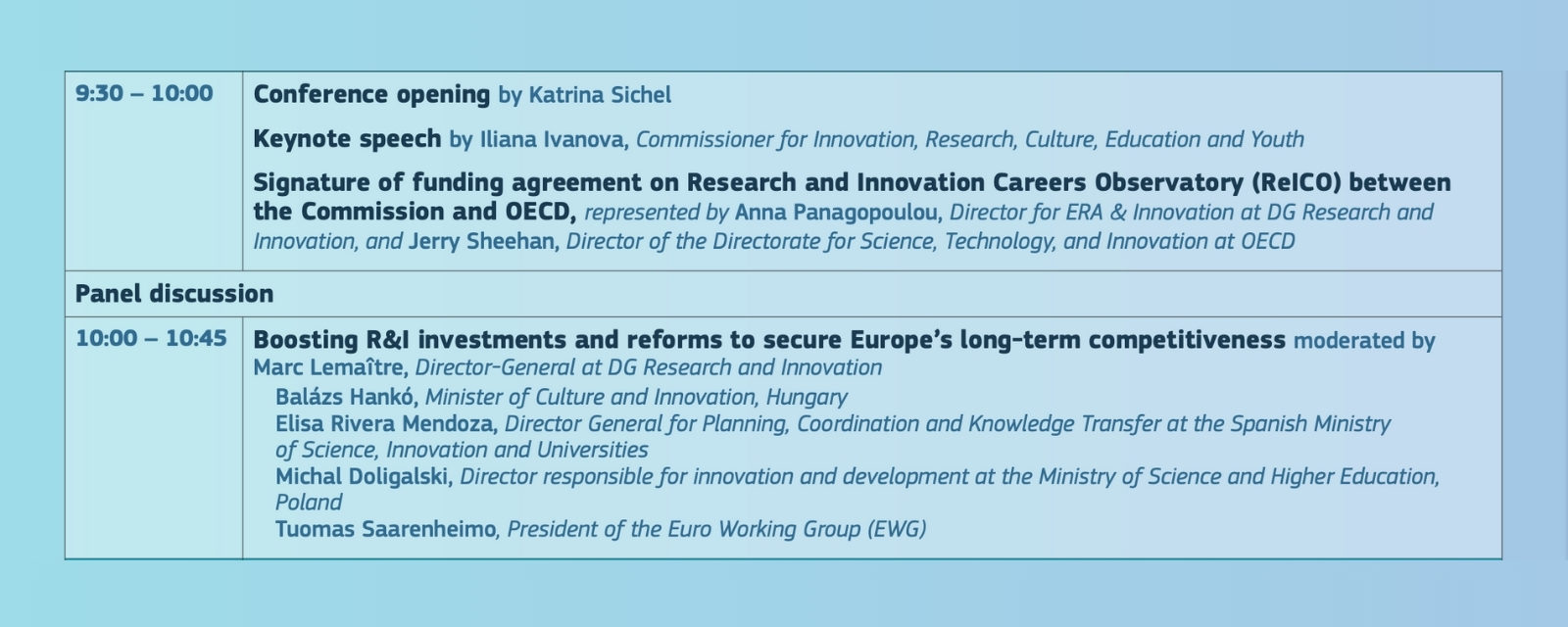With these opening words from Janez Potočnik, former Commissioner for Science and Research (2004–2010), the ERA Stakeholder Conference 2024 began. The ERIC Forum, alongside more than 15 key projects and entities contributing to improving the European Research Area (ERA), participated in the event.
The European Research Area is more than just an inspiring idea; it is an ongoing and evolving process. The European Research Area: Fostering Greater Integration. Advancing Competitiveness Conference, organised in Brussels by the European Commission, Directorate-General for Research and Innovation, with the support of the Horizon Europe INSPIRING ERA project, focused on discussing success stories and lessons learnt after four years of revamping the European Research Area and to explore the role of RIs policy in advancing European sustainable competitiveness.
The two-days event featured panel discussions and thematic sessions where researchers along with ministerial representatives and policymakers from various member States, European institutional representatives, and spokespeople for EU-relevant projects exchanged ideas and insights on the past and the future of European science.
Plenary Sessions – Day 1

Plenary Sessions – Day 2

Here are the plenary panels from the Conference, which were complemented by smaller, interactive thematic sessions on various topics of European interest. One key theme addressed was the empowerment of research and technology infrastructures as valuable assets and knowledge hubs.
A green and inclusive Europe
A key takeaway was the need to build a more inclusive Union—one that strongly supports scientific freedom and is committed to reducing its environmental impact. Janez Potočnik captured this sentiment in few words:
“The future will be green and equal, or there will be no future.”
Science is undeniably central to this process, as emphasized in the report Much More than a Market by Enrico Letta, one of the key documents quoted during the conference:
“Towards the end of his term, Jacques Delors hinted at the need to explore a new dimension for the Single Market. One potential avenue lies in the introduction of a fifth freedom to complement the existing four, aimed at enhancing research, innovation, and education within the Single Market. This fifth freedom would embed research and innovation at the heart of the Single Market, fostering an ecosystem where knowledge diffusion drives economic vitality, societal advancement, and cultural enrichment.”
However, much work remains to be done, particularly in terms of policy and regulation, to strengthen Europe’s position on the global stage —especially from an economic perspective. As Mario Draghi stated in The Future of European Competitiveness – another report to which many participants called attention:
“If Europe’s ambitious climate goals are matched by a coherent plan to achieve them, decarbonization will become an opportunity for Europe. But without coordinated policies, decarbonization could potentially hinder competitiveness and growth.”
It is no surprise, then, that advancing competitiveness and fostering greater integration were the central themes of the Conference. Significant disparities still exist among Member States regarding opportunities, professional recognition, and long-term political goals. The event in Brussels confirmed the urgent need for a more unified approach across the European Union.
The ERICs in the ERA
Although not directly involved in the panels, ERICs and their collective voice were cited as an example of how the European Union is working to provide the scientific community with a specialized legal framework for researchers. As Sergej Možina, co-chair of the ERA Forum, told Science | Business, the areas that have progressed in recent years are
“mostly where we gathered the political courage and the support to legislate in the framework programme, the European Research Infrastructure Consortia (ERIC), and the joint undertakings.”
Antje Keppler (Euro-BioImaging), Jana Pavlic-Zupanc (BBMRI), Bonnie Wolff-Boenisch (CESSDA), Maria Rujano (ECRIN) and Elisa Baioni (CERIC) from the ERIC Forum secretariat and communication represented the ERICs and their Forum. A dedicated stand highlighted the ERIC community, and an exclusive interview with Forum Chair Antje Keppler showcased their contribution to the shared goal of creating a single, borderless market for research, innovation, and technology across the EU.
Inspiring initiatives
The Conference also provided an opportunity to showcase inspiring initiatives and projects. The full list of featured projects is available on the Conference website. In the coming days, you will also be able to find recordings of the plenary sessions there.
Gender equality and scientific freedom were two of the main topics discussed at the conference, with a panel devoted to progress made, challenges ahead and current initiatives. Below you will find a few among those presented during the panels.
The GenderSAFE pledge for zero tolerance to gender-based violence

From their website:
“The Commission’s ERA Forum Sub-group ‘Inclusive Gender Equality in the ERA has recently published a Zero-tolerance code of conduct. It aims to address incidents of gender-based violence in research and higher education environments by setting out a common approach, definitions, and a list of principles to guide all stakeholders and individuals in the ERA, to create a European Research and Innovation environment free from all forms of gender-based violence, based on the values of gender equality and inclusiveness, respect, dignity and safety.”
EU Award for Gender Equality Champions

From their website:
“The Commission’s ERA Forum Sub-group ‘Inclusive Gender Equality in the ERA has recently published a Zero-tolerance code of conduct. It aims to address incidents of gender-based violence in research and higher education environments by setting out a common approach, definitions, and a list of principles to guide all stakeholders and individuals in the ERA, to create a European Research and Innovation environment free from all forms of gender-based violence, based on the values of gender equality and inclusiveness, respect, dignity and safety.”
Safe Science

From their website:
“SafeScience (WetenschapVeilig) helps scientists to find support in case of threats, intimidation or hate speech. For Scientists: On this page you can find out more about what you can do to reduce the risk, and the best way to respond. For managers: Interviews with scientists who have had to deal with threats consistently show: the reaction of the immediate supervisor is very important for the support the employee experiences. For employees: As an employer, the institution has a responsibility for the safety, health and well-being of its scientists and other staff members.”